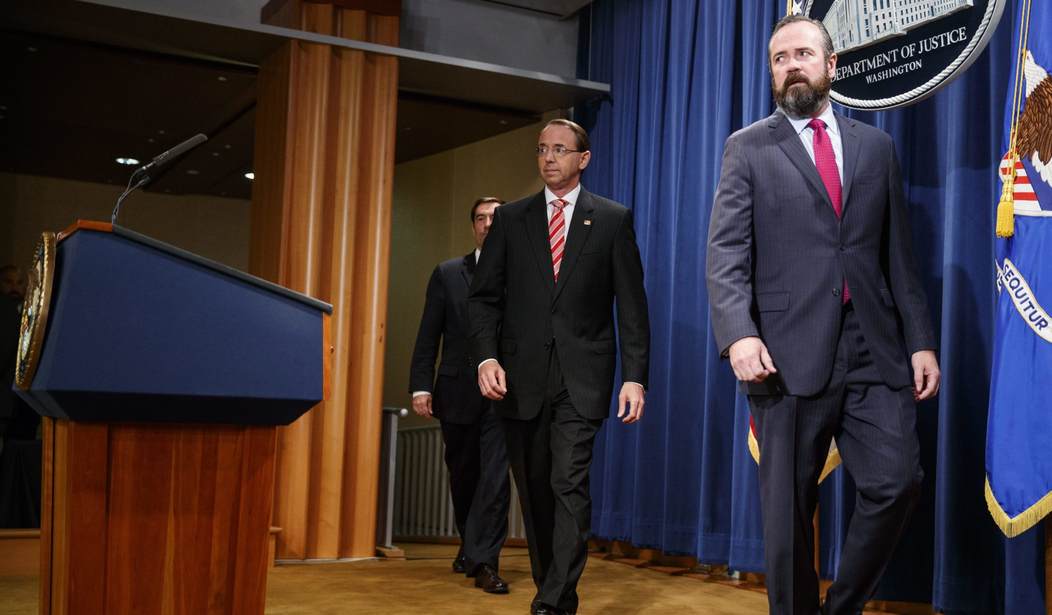Deputy Attorney General Rod Rosenstein warned at the Aspen Security Forum on Thursday that Russia’s influence campaign in the 2016 election “is just one tree in a growing forest” of Kremlin operations.
Rosenstein called it “a fraught moment” in history because for too long “we enjoyed the extraordinary benefits of modern technology without adequately preparing for its considerable risks.”
“Our adversaries are developing cyber tools not only to steal our secrets and mislead our citizens, but also to disable our infrastructure by gaining control of computer networks,” he said. “Every day, malicious cyber actors infiltrate computers and accounts of individual citizens, businesses, the military, and all levels of government.”
He referred to “malign foreign influence operations” as “a form of information warfare — covert propaganda and disinformation are among the primary weapons.”
“The Russian effort to influence the 2016 presidential election is just one tree in a growing forest. Focusing merely on a single election misses the point. As Director [of National Intelligence Dan] Coats made clear, ‘these actions are persistent, they are pervasive, and they are meant to undermine America’s democracy on a daily basis, regardless of whether it is election time or not,'” Rosenstein continued. “Russian intelligence officers did not stumble onto the ideas of hacking American computers and posting misleading messages because they had a free afternoon. It is what they do every day.”
Past Russian disinformation campaigns, he noted, included a Soviet effort during the Reagan administration to spread fake news that the Pentagon had created the AIDS virus as a biological weapon. In a “head-on” response, President Reagan established the interagency Active Measures Working Group to counter Soviet disinformation.
“Modern technology vastly expands the speed and effectiveness of disinformation campaigns. The Internet and social media platforms allow foreign agents to spread misleading political messages while masquerading as Americans,” he added. “…Elections provide an attractive opportunity for foreign influence campaigns to undermine our political processes. According to the intelligence community assessment, foreign interference in the 2016 election ‘demonstrated a significant escalation in directness, level of activity, and scope of effort compared to previous operations.'”
Hackers targeted election networks in at least 21 states in 2016, he said.
Rosenstein cautioned that “not everyone realizes that information posted on the Internet may not even come from citizens” and Internet comments “may not even come from human beings.”
“Intelligence assessments and criminal indictments are based on evidence. They do not reflect mere guesses. Intelligence assessments include analytical judgments based on classified information that cannot be disclosed because the evidence is from sources — people who will be unable to help in the future if they are identified and might be harmed in retaliation for helping America — and methods — techniques that would be worthless if our adversaries knew how we obtained the evidence. Indictments are based on credible evidence that the government must be prepared to introduce in court if necessary,” he explained. “Some people may believe they can operate anonymously on the Internet, but cybercrime generally creates electronic trails that lead to the perpetrators.”
“…The days when foreign criminals could cause harm inside America from remote locations without fear of consequences are past. If hostile governments choose to give sanctuary to perpetrators of malicious cybercrimes after we identify them, those governments will need to take responsibility for the crimes, and individual perpetrators will need to consider the personal cost.”
Rosenstein stressed that “in all cases” of detection and enforcement of malign cyber activity “partisan political considerations must play no role in our efforts.”
“We cannot seek to benefit or harm any lawful group, individual or organization. Our government does not take any official position on what people should believe or how they should vote, but it can and should protect them from fraud and deception perpetrated by foreign agents,” he said. “Unfettered speech about political issues lies at the heart of our Constitution. It is not the government’s job to determine whether political opinions are right or wrong.”
“But that does not leave the government powerless to address the national security danger when a foreign government engages in covert information warfare. The First Amendment does not preclude us from publicly identifying and countering foreign government-sponsored propaganda.”









Join the conversation as a VIP Member